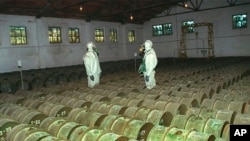On Sep. 2, Germany said its medical experts concluded that Russian dissident Alexey Navalny was poisoned with Novichok, the same chemical warfare agent used in the 2018 U.K. poisoning targeting an ex-Russian spy.
That same day, State Duma (lower house of Russia’s parliament) Deputy Yuri Shvytkin told the Russian state news agency RIA Novosti that Russia doesn’t manufacture Novichok – but that it could have come from the United States or Georgia.
“As far as there is information, such weapons, such chemical toxic substances are available on the territory of Georgia from the United States, in the laboratory, and in the United States of America," he said.
That is false.
The mention of a laboratory in Georgia is a likely a reference to the Richard Lugar Center for Public Health, located near the Georgian capital Tbilisi. For years, the lab has been a regular target of Russian disinformation, accused of viral outbreaks, including the coronavirus, and horror stories about experiments on human patients.
Such stories have been routinely debunked. Moreover, the lab (named after former U.S. Sen. Richard Lugar) focuses on studying – not manufacturing – various biological pathogens and not chemical weapons.
The United States has destroyed nearly all of its chemical weapons stockpiles under the terms of an international convention. What remains is located at the Blue Grass Army Depot near Richmond, Kentucky, and is expected to be gone by September 2023.
The weapons stockpiled at the depot consist of World War II-era shells and rockets. Novichok was invented in the Soviet Union in the 1970s and 1980s and only became known to Western countries in the 1990s.
Shvytkin’s suggestion that the nerve agent used on Navalny came from outside Russia contradicts other Russian claims that he was not poisoned at all.
As Polygraph.info reported on Sept. 2, Leonid Rink, the former director of the laboratory where Novichok was developed, claimed that Navalny – who remains comatose in a Berlin hospital – did not show symptoms of Novichok poisoning, specifically convulsions.
In fact, Navalny was seen exhibiting signs similar to convulsions when he suddenly fell ill on a plane traveling from Omsk to Moscow on Aug. 20. What’s more, doctors in the Russian city of Omsk initially diagnosed Navalny with acute poisoning before reversing themselves and denying that any toxins had been found in his system.
The rapid spread of contradictory explanations for what happened to Navalny mirrors Russia’s reaction to the poisoning of ex-Russian spy Sergei Skripal and his daughter Yulia in Salisbury, England, which also led to the inadvertent poisoning of two British citizens, one of whom, Dawn Sturgess, died.
Within approximately one month of the initial Salisbury incident in March 2018, disinformation monitors found that Russia had produced nearly 37 different alternate narratives to deflect blame away from Moscow.
These ranged from claims that the Skripals had actually overdosed on the narcotic fentanyl, to narratives that acknowledged the poison was Novichok but blamed other countries, including Ukraine and the U.K., for the poisoning.
Investigators in the U.K. determined that two suspected Russian agents were responsible for the attack on the Skripals, who survived and are now under protection. Boris Johnson, then Britain’s foreign minister, said British intelligence found more complicity.
"We actually have evidence within the last 10 years that Russia has not only been investigating the delivery of nerve agents for the purposes of assassination, but has also been creating and stockpiling Novichok," Johnson, who is now prime minister, told the BBC.
To date, the Kremlin has categorically denied any involvement in the Salisbury poisonings. Similarly, it has strenuously disputed the German findings, which were announced Wednesday (Sept. 2) by Chancellor Angela Merkel.
“Before the patient was taken to Germany, in accordance with all international standards, a whole series of tests was done in Russia, and no poisonous substance was found,” said Russian presidential spokesman Dmitry Peskov.
“There are no grounds to accuse the Russian state. And we are not inclined to accept any accusations in this respect,” Peskov said.
Alexei Navalny has spent years earning his reputation as one of Putin’s most prominent critics. He began by blogging about high-level corruption within Putin’s inner circle, as well as among members of the ruling United Russia party. He was a regular attendee and speaker at public protests – when he wasn’t detained by authorities for various reasons. In 2013, he ran for mayor of Moscow, scoring second place with much higher support than expected.
Navalny’s Anti-Corruption Foundation has produced numerous video investigations of high-level Russian officials, including 2017’s “Don’t Call Him Dimon,” which exposed the vast wealth and property of then-Russian Prime Minister Dmitry Medvedev.
In recent years, Navalny has been the target of physical attacks, often being doused with a medical chemical that dyes the skin green for a long duration. In the summer of 2019, he was hospitalized in another suspected poisoning, although he quickly recovered.
